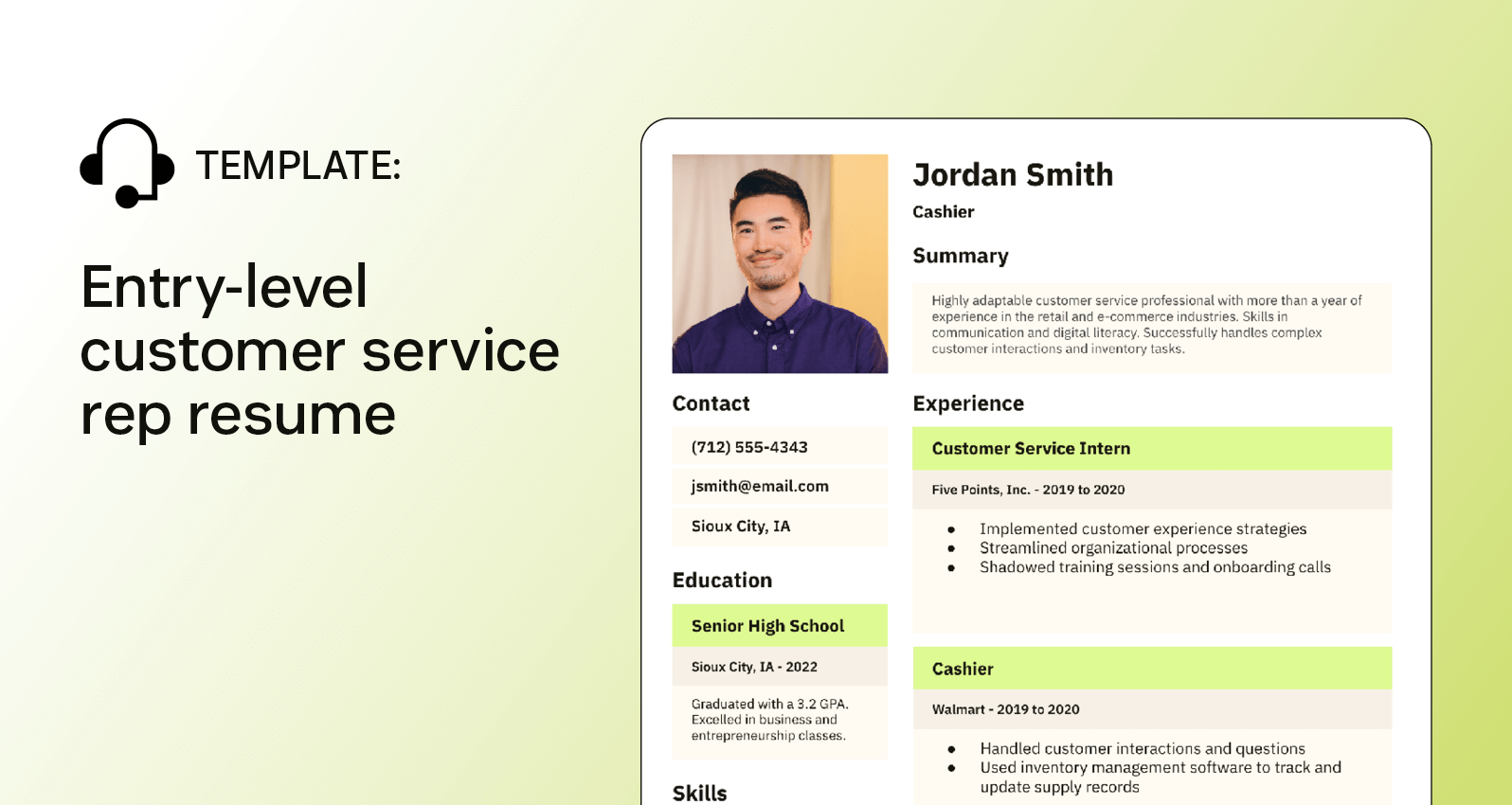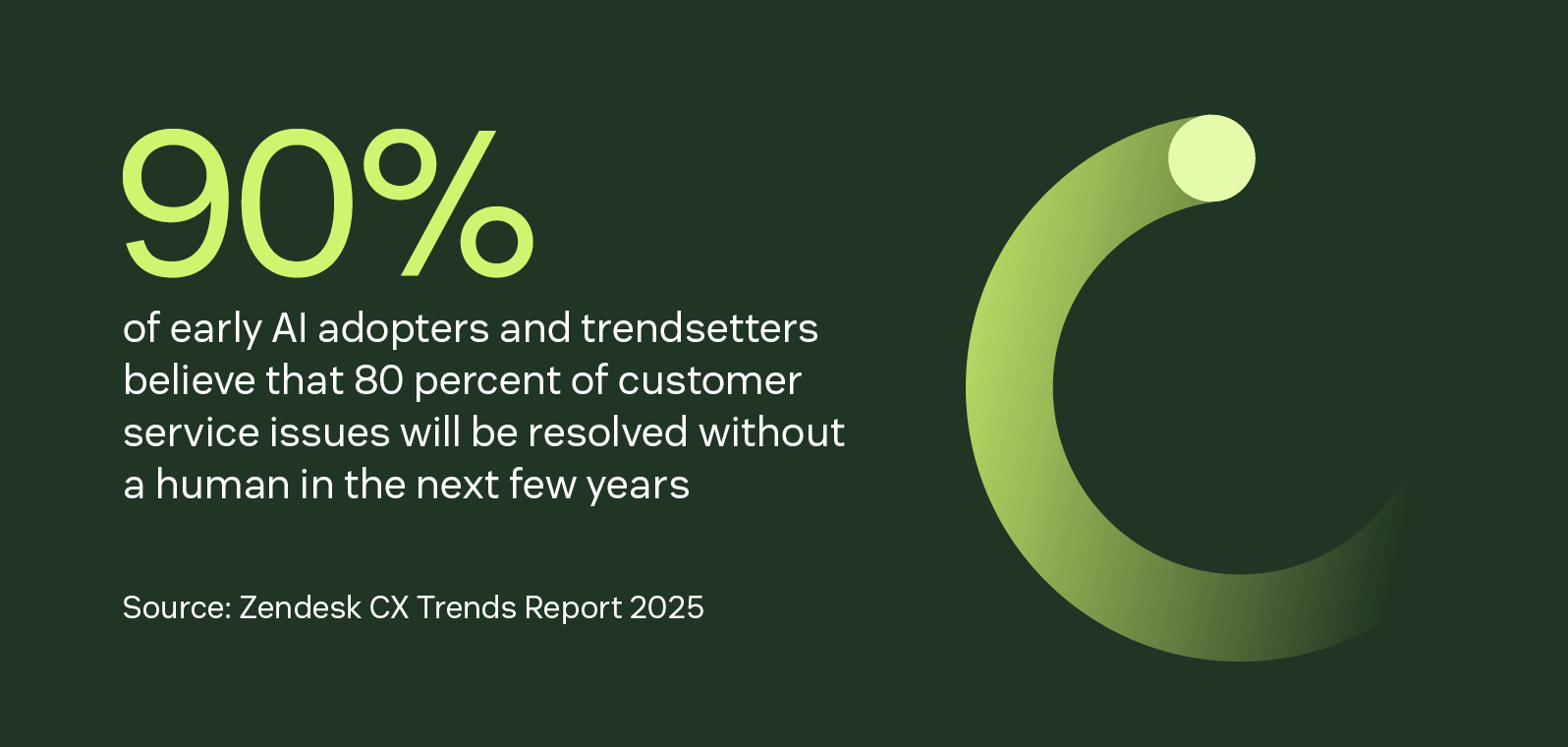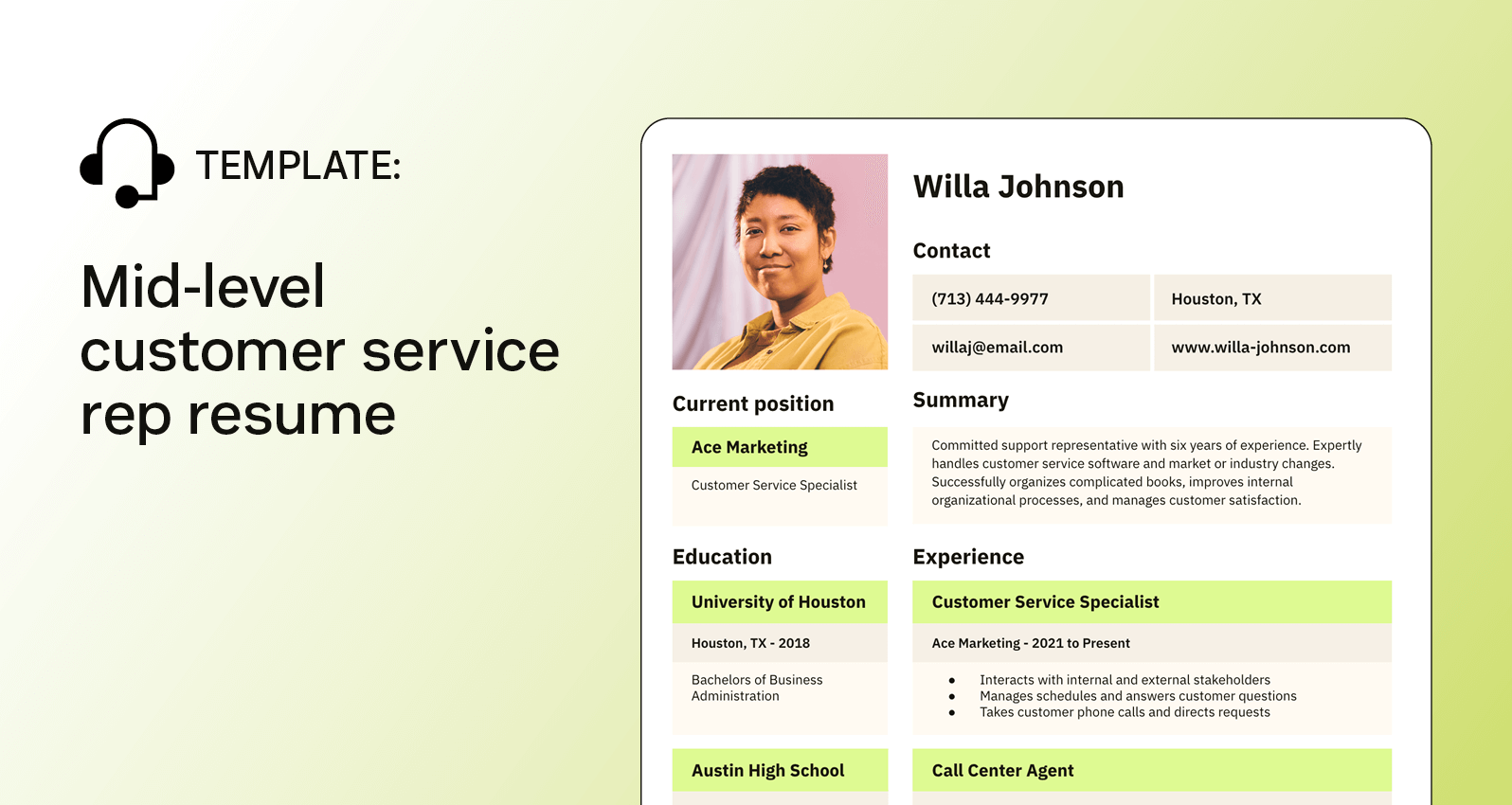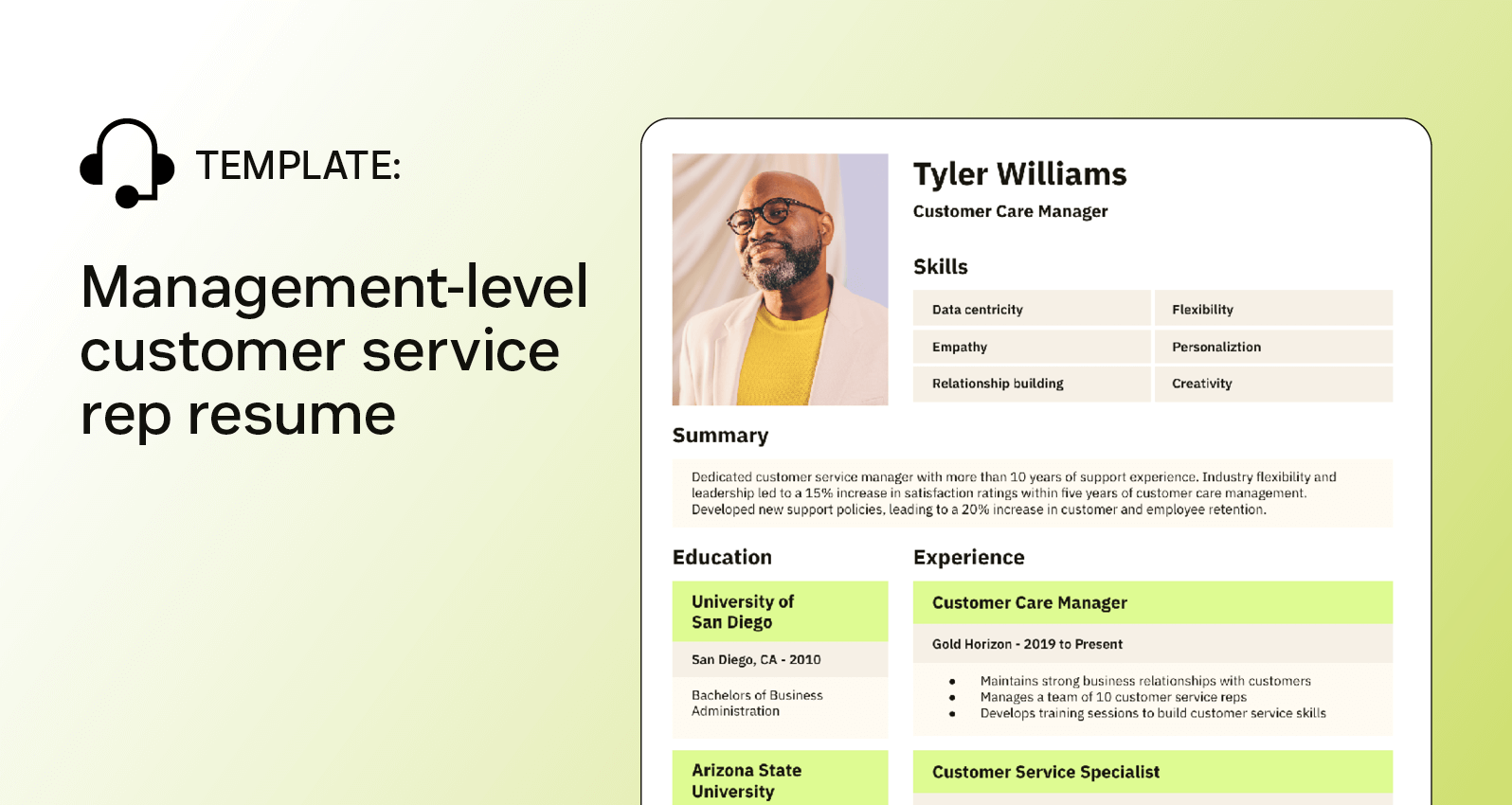Article • 5 min read
25 essential customer service skills and how to develop them
Learn the customer service skills behind great CX and showcase them on your resume with our easy-to-use templates.
Mozhdeh Rastegar-Panah
Senior Director, Product Marketing
最後更新: January 13, 2026
What is customer service?Customer service is the ongoing relationship between a business and its customers, covering every interaction from first contact to the end of the journey. It’s the art of helping, guiding, and delighting clients across multiple touchpoints, like phone, email, live chat, social media, or in-person. |
No matter the industry, exceptional customer service gives businesses a competitive edge. It’s a simple idea: Be great to your customers, and they’ll keep coming back, often bringing others with them.
Exceptional support doesn’t just happen, though. In addition to having the right customer service tools and technology, having the right customer service skills (like empathy, problem-solving, and digital fluency) is the key to making every interaction count.
Whether you’re growing your career or building a support team, our guide breaks down what skills to focus on, how to grow each skill, and tips for making them shine on your resume.
More in this guide:
- Why is customer service important?
- What are customer service skills?
- 225 top customer service skills
- How to build and nurture customer service skills
- Frequently asked questions
- Discover how to exceed your customer service goals
Why is customer service important?
Whether you’re working in sales, support, delivery, or some other position on the frontlines, being personable and forging human connections is essential for success.
Great customer service goes beyond just responding to inquiries. It also means documenting customer interactions, overseeing self-service support, and improving experiences through empathy, teamwork, and consistent service quality across all channels.
Bad customer service will break a business, but strong connections can increase customer loyalty and help organizations scale.
Good customer service impacts business growth by:
- Increasing customer retention and satisfaction: Happy customers are more likely to stick around and more likely to return when they feel supported.
- Creating lasting customer relationships and brand advocacy: A great service experience can turn one-time buyers into loyal fans who recommend your brand to others.
- Boosting sales and revenue: When agents understand customer needs, they can better support upsells, cross-sells, and repeat purchases.
- Delivering a competitive edge: In crowded markets, service can be a powerful differentiator that keeps customers coming back.
- Enhancing brand reputation: Strong support drives positive reviews and word-of-mouth.
- Strengthening human connection: Agents who genuinely listen and respond with empathy can uncover customer needs and influence purchase decisions in meaningful ways.
Genuine customer service agents and strong consumer relationships can help businesses identify and meet customer needs. These forces drive purchase decisions.
What are customer service skills?Customer service skills are the mix of interpersonal, technical, and problem-solving abilities that enable agents to create meaningful connections and resolve issues efficiently. From patience and empathy to digital literacy and product knowledge, improving these skills for customer service ensures agents can deliver a consistent and positive experience. |
25 top customer service skills
Businesses want to hire agents who arm themselves with customer service skills that properly support buyers and help set their organization apart from the rest.
If you’re a hiring manager, look for these skills for customer service when skimming resumes and searching for exceptional candidates. If you’re hunting for a new customer support position, follow along to learn more about the customer service job skills you develop to improve an organization’s customer experience (CX).
1. Empathy
One of the most important customer service skills, empathy, is essential in building customer relationships and de-escalating high-tension situations. A customer service agent must have the emotional intelligence to empathize with upset customers, collaborate with them, and work to find a solution.
Businesses that employ agents with strong conflict-resolution skills should allow reps to make exceptions to certain policies or decisions without extreme oversight. This can result in higher customer satisfaction scores and stronger loyalty, both essential customer service objectives.
How to improve this skill:
Actively consider the customer’s viewpoint before crafting your response.
Validate customer emotions, like frustration or confusion, directly and empathetically.
Analyze insights from challenging interactions to enhance your emotional intelligence and response.
How to highlight this skill on your resume: “Proven ability to de-escalate complex situations through empathetic communication and emotional intelligence.” |
2. Collaboration
Internal collaboration across teams is one of the top skills needed for customer service. In remote and hybrid working environments, agents don’t always have the option to walk over to a teammate’s desk to ask questions or brainstorm ideas. Yet the need for collaboration between colleagues and departments hasn’t waned.
With customer experience software that integrates with tools like Slack, agents can collaborate seamlessly. They can do this both inside and outside the organization, whether in the office or working from a beach in Hawaii.
How to improve this skill:
Contribute proactively to team discussions and internal communication platforms.
Leverage shared knowledge bases to ensure consistent information and alignment.
Pose clarifying questions in team settings to foster collective understanding and problem-solving.
How to highlight this skill on your resume: “Skilled in cross-functional collaboration using integrated communication tools to resolve issues and improve customer outcomes.” |
3. Communication
To improve the customer experience, agents should be capable of clear written and verbal communication. No matter who they’re speaking to or why, customer service agents need to have a firm understanding of:
Which communication channels are most appropriate for each situation
Who to speak to for a fast and accurate response to their specific issue
When to escalate a trouble ticket, and who will address the issue
How to be upfront with a customer and strike the right tone of voice
Strong communication skills help agents effectively manage their workloads and connect with customers. Each touchpoint is an opportunity to create a positive experience and make customers happy.
How to improve this skill:
- Tailor your tone and style based on the customer’s sentiment and preferred channel.
Compose concise follow-up summaries to confirm mutual understanding after interactions.
Analyze previous conversations to hone your clarity, tone, and overall phrasing.
How to highlight this skill on your resume: “Clear, concise communicator with experience handling complex support interactions across email, phone, and chat channels.” |
4. Efficiency
It’s common for customer support agents to get swamped with open tickets. However, when agents are efficient, they can complete more tasks quickly, which benefits both the employee and their employer.
Some major benefits of agent efficiency include:
- Saving money: By improving agent productivity, businesses can reduce operating costs, helping to save money and possibly afford raises and better benefits.
- Faster ticket resolutions: Seemingly insurmountable workloads can quickly become manageable when agents have strong multitasking skills.
- Lower average handle time (AHT): Agent knowledge, automation, and proactive support options help agents quickly handle customer service interactions.
Many organizations leverage automated software and AI to boost productivity. Customer service team leads are now expected to incorporate AI into team operations to increase team efficiency, encourage technology use, and systematize feedback.
For example, the Zendesk AI-powered ticketing system empowers agents to communicate with customers across channels in one unified app, improving resolution times and creating more organized customer service experiences.
How to improve this skill:
Use templated responses for common inquiries to streamline workflows.
Strategically prioritize tasks based on urgency and impact within your ticketing system.
Dedicate specific calendar blocks for concentrated work during peak service hours.
How to amplify this skill on your resume: “Highly efficient in managing high ticket volumes while maintaining quality, reducing AHT by streamlining workflows and tools.” |
5. Adaptability
Customers are everywhere now, including social media, SMS, email, and live chat. That means customer service agents must also be in those places. Adaptability allows agents to deftly switch between communication channels and messaging styles to provide an excellent customer experience.
Adaptable agents can also readily adjust to new market trends and changing customer needs, fostering customer orientation. As the customer service industry embraces emerging technologies, converts to remote and hybrid support options, and prioritizes omnichannel support, this skill is no longer optional but essential.
How to improve this skill:
Rotate between different support channels during your shift to flex your communication style.
Volunteer for beta testing or pilot programs when new tools launch.
Embrace feedback from new scenarios to refine your process quickly.
Here is an example of how you might highlight adaptability within your resume.

6. Speed
Quick customer service tip: Most customers don’t want to wait for a response. To meet customer expectations, agents must adhere to the standard communication speed—whether it’s seconds, minutes, or hours—on every platform they’re using to provide service.
Speed can also relate to how quickly a new agent learns the skills and tools they need to succeed or how fast they can resolve support issues. Both are equally important for customer service.
How to improve this skill:
Track and monitor response time metrics and set personal targets for improvement.
Use keyboard shortcuts and tools to accelerate response without sacrificing quality.
Complete onboarding courses ahead of schedule to gain confidence quickly.
How to highlight this skill on your resume: “Consistently meets or exceeds response time benchmarks while maintaining service quality.” |
7. Resiliency
High-performing customer service teams are resilient and don’t let critical customer feedback get the better of them. Resilient agents can take criticism and accept feedback gracefully.
However, this doesn’t mean your agents will like everything they hear. Unhappy customersare a part of the trade, but resilient agents can process and respond to frustrations quickly and effectively.
How to improve this skill:
Reflect on challenging interactions to identify growth opportunities.
Use support resources like coaching or peer mentorship to bounce back.
- Set boundaries to avoid call center burnout during high-stress periods.
How to highlight this skill on your resume: “Remains calm and professional under pressure, turning tough feedback into performance improvement.” |
8. Data centricity
Customer service agents should analyze data and gather actionable insights that help them enhance their performance and prioritize intelligent CX.
These data insights should relate directly to agent and customer behaviors to improve work habits and customer knowledge. With an advanced CX tool, agents can use AI to effortlessly crawl customer data and gather relevant insights and takeaways.
For example, agents can use data to:
Understand customer communication preferences, purchasing behavior, and personality.
Identify repeat issues and resolve the customer’s problems faster.
Assess their own performance.
See how they fit into the team as a whole.
As consumers change, so will real-time data insights, allowing businesses to quickly respond to new preferences or trends.
How to improve this skill:
Review analytics dashboards weekly to spot trends in customer issues.
Use insights from customer satisfaction surveys to improve service.
Track your personal KPIs to evaluate and refine your workflow.
How to highlight this skill on your resume: “Leverages customer data and performance metrics to enhance service quality and inform decision-making.” |
9. Relationship building
A culture of customer focus supports agents in building and nurturing customer relationships. This requires interpersonal skills and emotional intelligence. Businesses must arm agents with the context to personalize conversations to build customer trust and rapport.
This method helps agents develop the people skills needed for customer relationships. A strong connection builds trust in a brand. This, in turn, increases the chances of more purchases or following an agent’s upsell suggestions.
How to improve this skill:
Personalize conversations by referencing past interactions or preferences.
Follow up with customers after resolving issues to build trust.
Celebrate customer milestones, like anniversaries or big orders, when appropriate.
[Callout box]
How to highlight this skill on your resume: “Builds long-term customer trust through personalized service and ongoing relationship management.” |
10. Intuition
Intuition is one of many essential customer service representative skills required to better understand and help customers. Agents must be able to anticipate needs and pull relevant reference resources from a knowledge base while speaking to customers.
A culture of customer focus and reflective listening is key. Customers don’t like repeating themselves, and they expect agents to have immediate insights and solutions when they reach out. Intuitive agents can sift through the details, identify needs, and work more efficiently.
How to improve this skill:
Identify patterns in conversations to anticipate customer pain points.
Reference knowledge base articles without prompting to speed up support.
Offer proactive solutions before a customer outlines the full issue.
How to highlight this skill on your resume: “Intuitively identifies customer needs and provides fast, relevant solutions using deep product knowledge.” |
11. Tech proficiency
Intelligent technologies, such as Generative AI and AI agents, have become essential tools in customer service. Modern support agents must understand how to work with evolving tech tools like AI to be successful and provide more comprehensive support.
While many agents were initially wary of adopting AI, they have since embraced these technologies as powerful extensions of their customer service skillsets, enhancing their ability to deliver more comprehensive and efficient support.

In our Zendesk Customer Experience Trends Report 2026, we found that 86 percent of CX leaders believe AI will completely transform customer experience within the next three years. And 90 percent of early AI adopters and Trendsetters expect that businesses will solve 80 percent of customer service issues without human intervention in the near future.
Developing tech proficiency is now vital to strengthening agents’ customer service skills, enabling them to stay competitive.
How to improve this skill:
Explore and practice with tools like AI chatbots, macros, and automation settings.
Stay current on CX tech trends and share insights with your team.
Lead short peer training sessions on tool best practices.
How to highlight this skill on your resume: “Proficient in AI-powered support tools and automation platforms to streamline workflows and enhance customer experiences.” |
12. Digital literacy
Digital literacy requires technical and cognitive skills to find, access, and respond to online-based queries. It also requires agents to adhere to remote work best practices.
Agents with digital literacy skills can effectively communicate with colleagues and customers and utilize agent workspaces, tools, and additional resources. It’s OK if agents are unfamiliar with a specific database or software, but they should have the cognitive ability to pick up evolving digital tools quickly and incorporate them into their workflow.
How to improve this skill:
Learn shortcuts or productivity features within support platforms.
Troubleshoot minor tech issues independently before escalating.
Manage multiple digital tools without sacrificing speed or accuracy.
How to highlight this skill on your resume: “Digitally fluent with a track record of adapting quickly to evolving tools and remote support platforms.” |
13. Proactive mindset
Great agents can anticipate customer needs based on the contextual information stored in files and address concerns before customers even ask. Since they’re often the first to hear about recurring problems, customer service agents need to proactively anticipate issues, research solutions, and recommend changes.
An employee’s proactive mindset and behavior are telltale signs of an agent’s customer support experience and level of engagement. With this skill, agents can successfully eliminate concerns and create a better CX.
How to improve this skill:
Monitor trends in support tickets and flag recurring issues to leads.
Suggest help center updates based on recent inquiries.
Reach out to customers with updates before they follow up.
[Callout box]
How to highlight this skill on your resume: “Proactively identified and addressed common pain points, reducing support backlog and improving customer retention.” |
14. Problem-solving
When businesses utilize tools like IVR software and AI agents to speed up processes, agents have more time to focus on and find solutions to complex issues. A talented customer service rep can use their problem-solving skills to:
Listen to any customer problem.
Ask relevant follow-up questions to identify the problem.
Explain the pros and cons of various solutions to the customer.
Utilize available resources to find solutions to issues they’re unfamiliar with.
Identify who to speak with for additional information if they get stuck.
Showcasing these problem-solving skills shows you’re a versatile hire who thinks quickly and accomplishes goals.
How to improve this skill:
Use root-cause questioning to get to the heart of a customer issue.
Pull from previous similar cases to recommend solutions faster.
Escalate strategically only when necessary and never as a first resort.
How to highlight this skill on your resume: “Demonstrated ability to resolve complex customer challenges through analytical thinking and resourceful action.” |
15. Product knowledge
Customers expect agents to thoroughly understand the business’s products, services, and policies and be well-versed in their company’s industry.
When reviewing customer service resumes, hiring managers should look for candidates who have experience with software and tools, showing they can learn about products, technology, and the industry independently. Having handled complex products in the past can also show that a candidate is a good fit for the role.
How to improve this skill:
Study release notes and participate in product walkthroughs.
Practice explaining features using customer-friendly language.
Help colleagues with onboarding or FAQs to reinforce your expertise.
Here is an example of how you might highlight product knowledge within your resume.

16. Time management
An agent’s ability to use their time effectively shouldn’t go unnoticed. While similar to efficiency and productivity, time management is an important customer service skill all on its own.
Aside from obvious benefits like lower stress levels, more manageable workloads, and faster ticket resolutions, strong time management skills also help agents meet service level agreements (SLAs).
How to improve this skill:
Prioritize tickets by urgency and impact using internal SLAs.
Block calendar time for administrative tasks and training.
Use productivity timers to stay focused during high-volume hours.
How to highlight this skill on your resume: “Skilled in balancing high ticket volume while consistently meeting SLA targets and resolution benchmarks.” |
17. Patience
Instead of rushing to close tickets or end chats, patient service representatives take the time to pause, think, and act in their customers’ best interests. They use active listening, detailed problem-solving, and compassionate thinking to deal with angry customers while prioritizing CX.
Calmly meeting a customer’s questions, confusion, and frustration can be the difference between loyal and lost customers.
How to improve this skill:
Pause before responding to ensure tone and clarity.
Ask open-ended questions to uncover deeper frustrations.
Stay calm and steady when customers escalate emotionally.
How to highlight this skill on your resume: “Known for maintaining composure and delivering empathetic support in high-stress or emotionally charged situations.” |
18. Attentiveness
Attentiveness is crucial for hearing and understanding your customer’s direct and indirect requests. Support reps can identify common areas of confusion and frustration by paying attention to customer experiences and closely listening to their feedback.
While your client may never say your software’s interface is confusing, they may tell you specific functions are difficult to locate. Attentive listeners recognize this feedback for what it is: an indirect request for user experience updates.
How to improve this skill:
Read between the lines of feedback to spot patterns or pain points.
Take detailed notes during interactions to avoid repeat questions.
Follow up on past issues to show customers you heard them.
How to highlight this skill on your resume: “Highly attentive to customer cues, able to detect unmet needs and deliver targeted support that improves user experience.” |
19. Ambition
Ambitious agents are earnest, steadfast, and willing to go the extra mile to provide stellar customer service. Too much ambition can cause rifts in professional teams, but too little can lead to mediocre performance and poor customer service interactions.
Tenacious representatives will go beyond the bounds of their job description to positively impact customer experiences. While cultivating this skill can be challenging, mastering it ensures that customer questions and issues are handled thoroughly and accurately.
How to improve this skill:
Volunteer to pilot new tools or help build out team documentation.
Set personal benchmarks for KPIs and ask for feedback on progress.
Seek stretch assignments that grow product or process expertise.
How to highlight this skill on your resume: “Motivated self-starter who consistently seeks opportunities to improve performance and elevate the customer experience.” |
20. Open-mindedness
Inquisitive and compassionate agents who use inclusive language are viewed as honest, trustworthy, and reliable, significantly impacting customer satisfaction and loyalty. Service reps who ask questions, refrain from passing judgment, and consider multiple viewpoints before making decisions are irreplaceable.
Open-minded agents are willing to be challenged, stay humble about experience and expertise, and freely offer empathetic responses and solutions to all customer issues.
How to improve this skill:
Ask clarifying questions before forming conclusions.
Invite feedback from teammates with different experiences.
- Adjust your communication style to meet customer preferences.
[Callout box]
How to highlight this skill on your resume: “Open-minded collaborator with a strong ability to adapt to new perspectives and deliver inclusive, empathetic service.” |
21. Personalization
Personalized customer communication can positively impact CX, and knowing who your customers are and what they want can transform good service into great service.
Successful customer service management prioritizes creating customer profiles so all agents know a customer’s brand history, demographic details, and needs. Use these profiles to correctly spell or pronounce names, provide location-specific services, and tailor communication.
How to improve this skill:
Use CRM data to customize greetings and recommendations.
Reference past interactions to show attentive service.
Adapt responses to reflect customer preferences and history.
How to highlight this skill on your resume: “Delivered tailored customer experiences by leveraging detailed client profiles to boost satisfaction and loyalty.” |
22. Creativity
Offering customers innovative solutions to complex problems entices them to stay loyal and continue asking questions.
A creative and resourceful agent typically takes a classic service interaction from forgettable to memorable. Asking unique but relevant questions, referencing customer interests, presenting out-of-the-box solutions, or offering discounts can delight customers and improve interactions.
How to improve this skill:
Brainstorm alternative solutions when standard responses fall short.
Incorporate customer interests to personalize upsell or service suggestions.
Develop unique ways to explain complex product features.
How to highlight this skill on your resume: “Applied creative problem-solving to enhance customer interactions and drive satisfaction.” |
23. Upselling and cross-selling
As the first line of defense, support agents may intercept product requests or questions from interested customers. These agents must be able to influence, effectively reason with, and encourage action from interested parties without hesitation.
When an upselling or cross-selling opportunity arises, support agents can tap into their in-depth product knowledge and strong communication skills. With a keen understanding of their customers’ needs, service reps can make product- or service-specific suggestions based on best fit. Alternatively, they seamlessly transfer customers to a sales representative when necessary.
How to improve this skill:
Identify cues that indicate readiness for additional products or services.
Use consultative language to suggest relevant options.
Collaborate with sales teams to ensure smooth handoffs.
How to highlight this skill on your resume: “Skilled at recognizing and acting on upsell and cross-sell opportunities, contributing to revenue growth.” |
24. Coachability
Coachable customer service reps understand that advice and feedback can come from anyone, including peers or direct reports. They are willing to listen actively and implement feedback into their daily routines and customer interactions.
While coachability is a great skill, it doesn’t happen without an open line of communication, approachable management teams, and the willingness to learn.
How to improve this skill:
Request regular feedback and adjust your approach accordingly.
Observe and incorporate best practices from top-performing teammates.
Reflect on customer interactions and identify areas for improvement.
How to highlight this skill on your resume: “Demonstrated openness to feedback, continuously improving skills to enhance customer support quality.” |
25. Flexibility
While adaptable customer service representatives anticipate and plan for changes, flexible agents react to and accommodate customer needs immediately and situationally.
Flexibility in a support environment is especially useful when there are immediate changes to service software, working environments, hybrid or remote communication methods, and company products or services.
How to improve this skill:
Quickly shift priorities in response to urgent customer or business needs.
Learn new tools and processes as they are introduced.
Adjust communication style based on channel and customer mood.
Here is an example of how you might highlight flexibility within your resume.

How to build and nurture customer service skills
Skill development is an ongoing journey. Whether you’re looking to help your agents sharpen their customer service skills or apply for a customer service job, you can do a few things to build and nurture the essential skills.
Frequently asked questions
Customer story


BombBomb
BombBomb improves CSAT with video support
“Agents have the opportunity to save accounts or to upsell accounts. If you think about your support organization only as a cost center, you’re not thinking big enough.”
Jonathan Bolton
SVP of Operations
Discover how to exceed your customer service goals
Companies that invest in comprehensive customer service training and maintain high hiring standards recognize that superior customer service is not just a department—it’s a competitive advantage that drives business growth, customer loyalty, and long-term success.
Great customer service skills can be a valuable asset for hiring managers and potential employees. From scaling customer support teams to landing the perfect role, every agent needs to develop customer service job skills.
By prioritizing these customer service qualities and skills and continually working to enhance them, job seekers can set themselves apart in large candidate pools and advance their careers.
With the help of a complete customer service solution like Zendesk for customer service, businesses can boost their customer service strengths, identify customer needs, build stronger relationships, and provide exceptional support.
